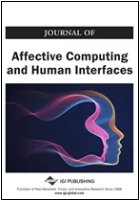Taking over as an of Editor-in-Chief (EiC) of an academic open access journal is a distinguished honor that carries a lot of responsibility and dedication. We recently reached out to Professor João Rodrigues, from the University of the Algarve, ISE & LARSyS, Portugal, who is the EiC of
Journal of Affective Computing and Human Interfaces (JACHI) to hear his thoughts, outlook, and mission for leading an open access journal.
Professor Rodrigues' journal, Journal of Affective Computing and Human Interfaces, provides a forum for the advancement of knowledge and methods necessary to recognize, interpret, process, and simulate human feelings, sentiments and emotions, and a way to link them with human major senses.
Journal of Affective Computing and Human Interfaces, formerly the International Journal of Synthetic Emotions (IJSE) was established in 2010 as a hybrid journal and converted to a gold open access journal on January 1st, 2023.
What inspired you to become the Editor-in-Chief of the IGI Global journal JACHI?
Professor Rodrigues: Being Editor-in-Chief is motivated by the desire to support a cutting-edge platform (journal) that combines the most recent findings and developments in affective computing, social robotics, and human-machine interfaces. The goal is to enhance moral ideals, ethical standards, and responsible technology use to guarantee that technological advancements in this area benefit humanity. This journal is a crucial resource for anybody interested in the nexus between emotion and technology because of the conceptual synergy between computer scientists, cognitive scientists, psychologists, neuroscientists, and philosophers.
To you, what are the most important attributes of your journal? What sets your journal apart from others?
Professor Rodrigues: The key features of the
Journal of Affective Computing and Human Interfaces (JACHI) are its interdisciplinary approach to affective computing and human-machine interfaces, its emphasis on Human-Centered Artificial Intelligence, and its stringent peer-review procedure. To publish and discuss high-quality research on subjects such as emotion recognition, sociable robotics, human-computer communication, and other related areas, JACHI offers a singular forum for academicians, practitioners, and researchers. Furthermore, JACHI is freely accessible via open access globally, making the research available to anyone. JACHI stands out from other journals due to these characteristics, which make it a useful tool for those researching the relationship between AI and emotional responses in humans.
What does it mean for you to lead an open access journal where all new published content will be freely available worldwide?
Professor Rodrigues: Leading an open access journal where all newly published content is freely available worldwide is an important responsibility. It means ensuring that high-quality research is accessible to all, regardless of their financial or institutional constraints. Open access publishing also enables wider dissemination of research, increasing its impact and reach. As an editor, it requires balancing the financial sustainability of the journal with the goal of making research widely available. It also requires ensuring that the peer-review process is rigorous to maintain the quality of published content. In summary, leading an open access journal involves a commitment to making research accessible, transparent, and impactful for the benefit of the scientific community and society at large.

Who will benefit from the open access research within JACHI?
Professor Rodrigues: The open access research within JACHI will benefit a wide range of individuals, groups and corporations, including researchers, academics, practitioners, students, policymakers, and, of course, the general public. Researchers and academics will benefit from having access to the latest research in affective computing and human-machine interfaces, enabling them to stay up-to-date with the latest developments in the field. Corporations and practitioners will benefit from the ability to apply this research to develop new technologies and products that can improve people's lives. Students will benefit from having access to high-quality research, helping them to learn and develop their ideas. Policymakers will benefit from understanding the potential impacts of these technologies on society and developing policies that support responsible development and use. Finally, the general public will benefit from increased awareness and understanding of these technologies, which can ultimately lead to better and more inclusive technologies.
What is your outlook on Open Access research in the future as more mandates are put in place and more publications take up the open access model of publishing?
Professor Rodrigues: The future of open access research looks bright as more institutions and funding organizations around the world implement policies to support open access publishing. This pattern is anticipated to continue, with more academic institutions and researchers adopting the open access model to boost the impact and visibility of their research. It is projected that open access publication will continue to play a significant role in the diffusion and impact of research as it becomes more widely accepted. The COVID-19 pandemic has also brought attention to the value of open access research in facilitating the quick and extensive sharing of scientific information, which will probably encourage more researchers to choose this publishing approach in the future.
Are there any trending/niche research areas that you are looking for in the articles submitted to your journal? What are some future directions for your research?
Professor Rodrigues: JACHI welcomes research articles on a wide range of topics related to affective computing, human-machine interfaces, and related areas. Affective computing applied to adaptative user interfaces, socially assistive robotics, multimodal interaction and communication, human-centered artificial intelligence, virtual and augmented reality for emotional experiences, and well-being applications are just a few of the cutting-edge and specialized research areas that JACHI is looking for.
There are several future directions for research in JACHI that could contribute to the advancement of the field of affective computing and human-machine interfaces. One direction could be the development of more sophisticated emotion recognition and analysis techniques that take into account individual differences and cultures as well as the analysis and the use of the human 5 senses in emotional expression and perception. Another direction could be the integration of affective computing with other emerging technologies such as wearable devices, virtual assistants, and autonomous vehicles. Additionally, research on the ethical and social implications of affective computing and human-machine interfaces could shed light on how to design systems that are both effective and responsible. Finally, the development of more inclusive and accessible affective technologies could lead to a more diverse and equitable use of these technologies in various domains, including healthcare, education, and entertainment.
For those interested in submitting their paper for consideration, submit here.
What advice do you have for researchers seeking to publish academic research in this field?
Professor Rodrigues: My advice to researchers seeking to publish academic research in JACHI would be to ensure that their work aligns with the journal's scope and mission, which is to advance knowledge and methods necessary to recognize, interpret, process, and simulate human feelings, sentiments and emotions, and to link them with human major senses. They should also strive to make their research innovative, rigorous, and impactful, with clear contributions to the field of affective computing and human interfaces. In addition, they should carefully follow the submission guidelines and ensure that their work undergoes thorough review and revision before submission to increase the chances of acceptance.
How would you suggest researchers utilize the content from this journal that will become freely accessible?
Professor Rodrigues: The freely available JACHI content can be used by researchers in a variety of ways. First, they can keep abreast of new publications by frequently checking the journal's website for new content on affective computing and human-machine interfaces. Additionally, they can cite pertinent studies and expand on previously known information by using the articles as references for their research. Thirdly, by reading articles written by subject-matter experts and learning about cutting-edge technologies and methodologies, researchers can use the journal as a tool for their professional development. Finally, academic libraries can profit from the JACHI open access model by giving their clients free access to top-notch research.
Thank you to Professor Rodrigues for his dedication and commitment to keeping his journal to the highest quality, as well as sharing his insights as an EiC. The Journal of Affective Computing and Human Interfaces and all IGI Global journals are currently seeking submissions.

Please visit the
Call for Papers page for all IGI Global journals seeking submissions. Published under Gold Open Access, these journals offer research that is freely accessible to all members of the research community. Please utilize these resources by browsing all
Open Access Articles and Chapters.
|
|
| Submit to IGI Global’s Highly Indexed Journals Included in Web of Science SCIE and/or SSCI | |
|
About Professor João Rodrigues

Professor João Rodrigues graduated in Electrical Engineering in 1993, he got his M.Sc. in Computer Systems Engineering in 1998 and Ph.D. Electronics and Computer Engineering in 2008 from the University of the Algarve (UAlg), Portugal. He is Adjunct Professor at Instituto Superior de Engenharia, also in the UAlg, where he lectures Computer Science and Computer Vision Curricular Units since 1994. He is pro-rector for transference and innovation, and member of associative laboratory LARSyS (ISR-Lisbon), and investigation units CIAC (UAlg) and CINTAL (UAlg), and the Associations APRP, IAPR, SUPERA, and ARTECH. He participated in more than 20 financed scientific projects, 5 of them as PI. He is co-author of more than 200 scientific publications, including several books. His major research interests lie in computer vision, augmented reality, human-machine cooperation, human-computer interaction and augmented intelligence.
About IGI Global
Founded in 1988 and headquartered in Hershey, Pennsylvania, USA with a subsidiary office (IGI Science and Technology, Ltd.) operating out of Beijing, China, IGI Global is a leading medium-sized independent international academic publisher of scholarly reference sources. They are committed to facilitating the discovery of pioneering scientific research that enhances and expands the body of knowledge available to the research community through traditional and open access publishing workflows. Working in close collaboration with more than 200,000+ expert researchers and professionals from leading institutions, IGI Global publishes quality peer-reviewed content in three major academic subject areas:
Learn more about IGI Global
here.